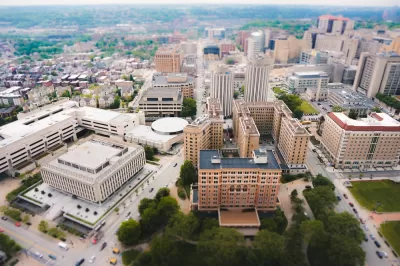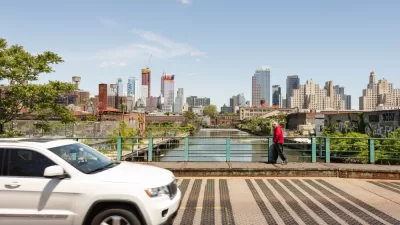The Pittsburgh City Council gave the green light to a zoning amendment that could eventually produce 1,000 apartment units planned for the neighborhood of Oakland.

The Pittsburgh City Council voted recently to move forward with zoning changes to accommodate a new subdistrict development that would add 1,000 apartment units and amenities to the neighborhood of Oakland. The zoning amendment is now onto the city's planning commission for a hearing and a recommendation.
Mark Belko reports on the council's vote, unanimous despite the opposition of some in the neighborhood, like the Oakland Planning and Development Corporation, "a registered community group that has led the fight to delay action, ripped council’s decision." Opponents are hoping the city would wait to approve the zoning changes until the completion of a neighborhood master plan.
Hanging in the balance is a proposal by developer Walnut Capital "to add a new subdistrict to five existing public realm districts in Oakland," according to Belko. "The change would accommodate its proposal to add 1,000 apartment units and other amenities in the central and south parts of the neighborhood."
Councilmember Bruce Kraus, who represents the neighborhood of Oakland, negotiated changes to the zoning amendment for the project that include "drastically" reduced building heights, according to Belko.
The development, as currently planned, could include more than six new apartment buildings, with no allotment for affordable units. The legislation would require, however, "that at least 10% of the units in an apartment complex be designated as 'walk to work' housing. Those units cannot rent for more than 30% of a person’s gross income."
FULL STORY: City pushes ahead bill that would aid developer’s plan for Oakland

Study: Maui’s Plan to Convert Vacation Rentals to Long-Term Housing Could Cause Nearly $1 Billion Economic Loss
The plan would reduce visitor accommodation by 25,% resulting in 1,900 jobs lost.

North Texas Transit Leaders Tout Benefits of TOD for Growing Region
At a summit focused on transit-oriented development, policymakers discussed how North Texas’ expanded light rail system can serve as a tool for economic growth.

Alabama: Trump Terminates Settlements for Black Communities Harmed By Raw Sewage
Trump deemed the landmark civil rights agreement “illegal DEI and environmental justice policy.”

How Community Science Connects People, Parks, and Biodiversity
Community science engages people of all backgrounds in documenting local biodiversity, strengthening connections to nature, and contributing to global efforts like the City Nature Challenge to build a more inclusive and resilient future.

Alabama: Trump Terminates Settlements for Black Communities Harmed By Raw Sewage
Trump deemed the landmark civil rights agreement “illegal DEI and environmental justice policy.”

Dear Tesla Driver: “It’s not You, It’s Him.”
Amidst a booming bumper sticker industry, one writer offers solace to those asking, “Does this car make me look fascist?”
Urban Design for Planners 1: Software Tools
This six-course series explores essential urban design concepts using open source software and equips planners with the tools they need to participate fully in the urban design process.
Planning for Universal Design
Learn the tools for implementing Universal Design in planning regulations.
City of Santa Clarita
Ascent Environmental
Institute for Housing and Urban Development Studies (IHS)
City of Grandview
Harvard GSD Executive Education
Toledo-Lucas County Plan Commissions
Salt Lake City
NYU Wagner Graduate School of Public Service





























